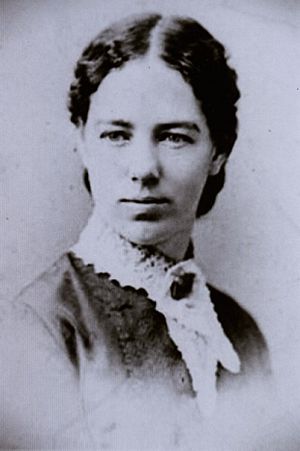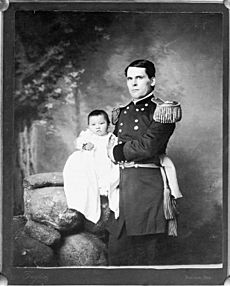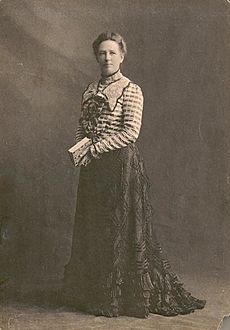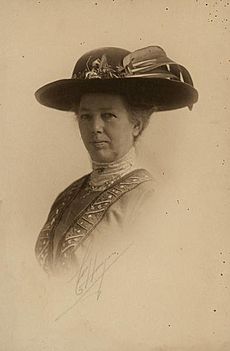Clara Bewick Colby facts for kids
Quick facts for kids
Clara Bewick Colby
|
|
|---|---|
 |
|
| Born | August 1, 1846 |
| Died | September 7, 1916 (aged 70) |
| Occupation | Writer - Journalist |
| Signature | |
Clara Dorothy Bewick Colby (born August 1, 1846 – died September 7, 1916) was an important person who worked for women's rights. She was born in England and later moved to the United States. Clara became a speaker, a newspaper owner, and a journalist. She was also a leader in the suffragist movement, which fought for women's right to vote.
In 1883, Clara started her own newspaper called The Woman's Tribune in Beatrice, Nebraska. A few years later, she moved the newspaper to Washington, D.C.. It quickly became the most important newspaper in the country for women's suffrage. Clara also believed in peace and spoke at big peace meetings. She was even the first woman officially recognized as a war correspondent during the Spanish–American War in 1898.
Besides her work for women's rights and her newspaper, Clara was a talented speaker and writer. She was also known for explaining the works of the poet Walt Whitman. She traveled to many international meetings, including the International Congress of Women in London in 1899. She represented Oregon at the First International Moral Education Congress in London in 1908. She was also a delegate at the First International Peace Congress in London in 1911. Clara was a leader in the Nebraska Woman Suffrage Association for many years. She wrote articles for popular magazines like Harper's Bazaar. She also worked as a newspaper correspondent for several important groups. Clara often spoke to lawmakers to support women's right to vote, both in the U.S. and in England.
Contents
Clara's Early Life and Education
Clara Bewick Colby was born in Gloucester, England, in 1846. Her parents were Thomas and Clara Bewick. When she was eight years old, her family moved to a farm near Windsor, Wisconsin. Clara came from a big family, so she didn't get to go to school much. But her father helped her and her siblings study at home during the winter evenings. This way, she learned enough to become a teacher in country schools. Clara's grandfather, Thomas Bewick, was a famous artist and expert on nature.
At age nineteen, Clara moved to Madison, Wisconsin, to live with her grandparents. She enrolled at the University of Wisconsin–Madison, which was a new school at the time. Clara played a big part in helping women get accepted into the university. She also helped the school decide to allow both men and women to study together. In 1869, she was the top student in the first class of women to graduate from the university. She then became a history and Latin teacher there while continuing her own studies.
In June 1871, Clara married Leonard Wright Colby, who had also graduated from the same university. The next year, they moved to Beatrice, where Leonard became a state senator. Even with the challenges of starting a new life in a new place, Clara found time to help her community. In 1873, she started Beatrice's first free public library.
Working for Women's Rights
Clara edited a section called "Woman's Work" in the Beatrice Express newspaper. In 1883, she started her own newspaper, The Woman's Tribune. She used her newspaper to support the movement for women's right to vote. The Woman's Tribune was so well-made that it won an award at the Paris Exposition in 1900. For a while, it was the official newspaper of the National Woman Suffrage Association.
Clara was friends with famous women's rights leaders like Elizabeth Cady Stanton and Susan B. Anthony. She gave many speeches to general audiences and to lawmakers. In 1888, during a big international meeting for women in Washington, D.C., Clara published The Woman's Tribune every day. This was probably the first time a daily newspaper for women was published by a woman. From 1885 to 1898, she was the president of the Nebraska Woman Suffrage Association.
Clara also spoke up for soldiers during the Spanish–American War in 1898. During this war, she was officially named a war correspondent. This made her the first woman to get such a recognition. She also promoted peace at the Panama–Pacific International Exposition in San Francisco, California, in 1915.
Speaker and Writer
Clara was interested in spiritual topics and contributed to Elizabeth Cady Stanton's book, The Woman's Bible (1895). Clara traveled and spoke in almost every state in the U.S. She also gave speeches in England, Ireland, Scotland, and other parts of Europe. She took part in most of the major campaigns to get women the right to vote in different states. For a time, she lived in Oregon and helped with several suffrage campaigns there.
In 1899, she went to the Great International Council of Women in London. There, Clara met many important suffrage workers. She was a delegate to the International Moral Education Congress in London in 1908. In the same year, she attended the International Women Suffrage Alliance meeting in Amsterdam. After her newspaper, The Tribune, stopped publishing in 1909, Clara spent a lot of time in England. She helped English suffragists in their fight for justice. She also met many famous English reformers. She wrote about her experiences in England for the Washington Herald newspaper.
Clara also wrote a book called "The History of London," but it was never published. Her sister, Dr. Mary B. White, kept the book. From 1911 to 1913, Clara was a delegate at several international meetings. These included the International Races Congress in London (1911), the International Woman Suffrage Convention in Budapest (1913), and the International Peace Conference in The Hague (1913). During the winters of 1913–1915, Clara gave lectures in Washington on many interesting topics, such as:
- "Florence Nightingale"
- "Women in the Building of America"
- "Woman's Work in English Fiction"
- "Euripides, and his Types of Greek Women"
Clara's Personal Life
Clara married Leonard Colby in 1872, and they moved to Beatrice, Nebraska. They did not have their own children. In 1885, they adopted a boy named Clarence, who was born around 1882. In 1891, Leonard returned home from the Battle of Wounded Knee. He brought with him a baby girl from the Sioux tribe named Zintkala Nuni (Lost Bird) and adopted her. Clara was away giving speeches about women's right to vote at the time. Leonard later left with Lost Bird's nursemaid. Clara and Leonard divorced in 1906. Lost Bird stayed with Clara, but she was sent to Indian Boarding Schools until she was 17.
Clara was a lifelong member of the Congregational church. She was also interested in the New Thought spiritual movement. She held an honorary leadership role in the International New Thought Alliance. In her later years, Clara's health declined. She died at her sister's home in Palo Alto in 1916 from pneumonia and myocarditis (a heart condition). Her ashes were buried in Windsor, Wisconsin, where she grew up.
See also
 In Spanish: Clara Bewick Colby para niños
In Spanish: Clara Bewick Colby para niños
 | Emma Amos |
 | Edward Mitchell Bannister |
 | Larry D. Alexander |
 | Ernie Barnes |




